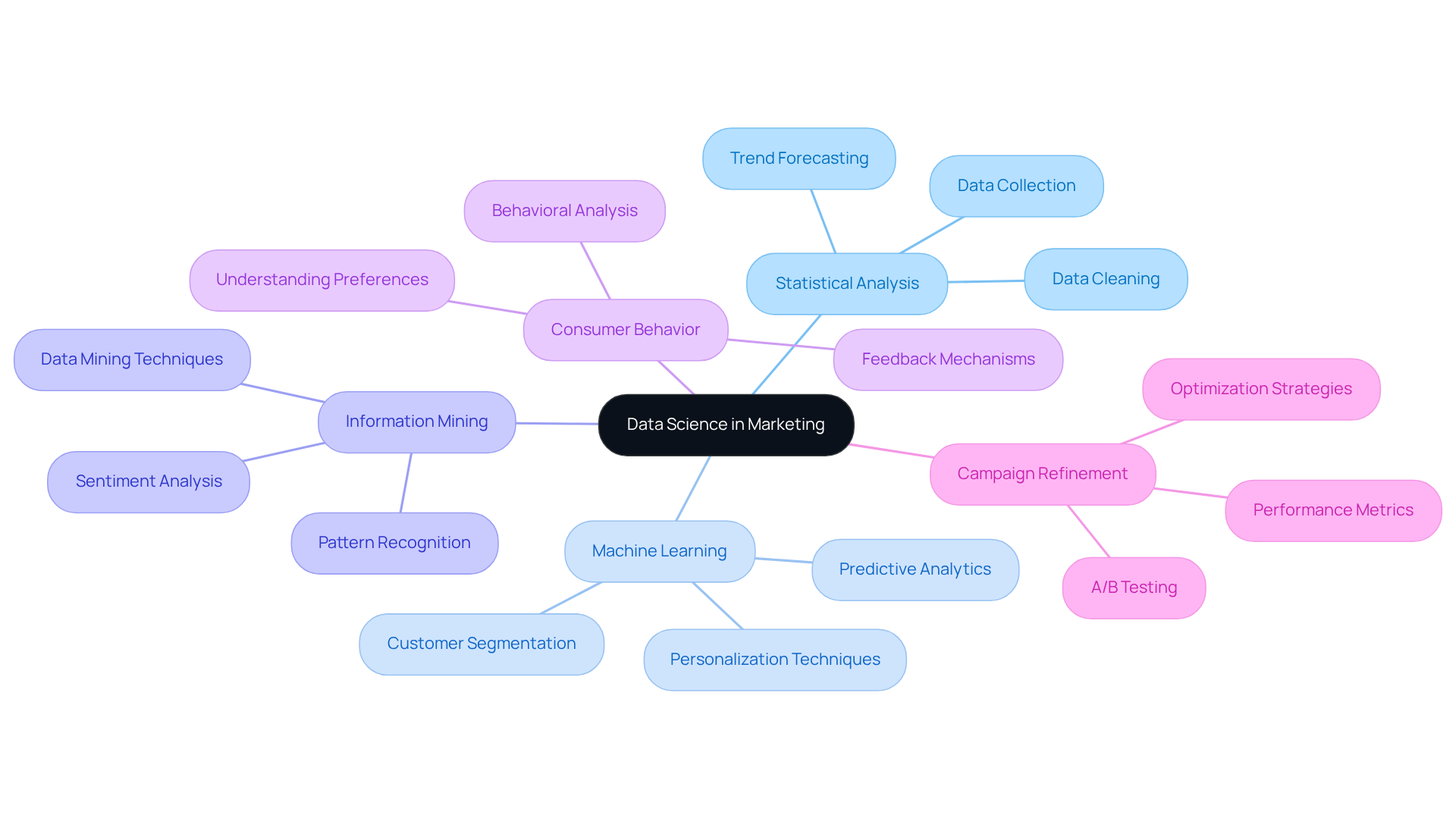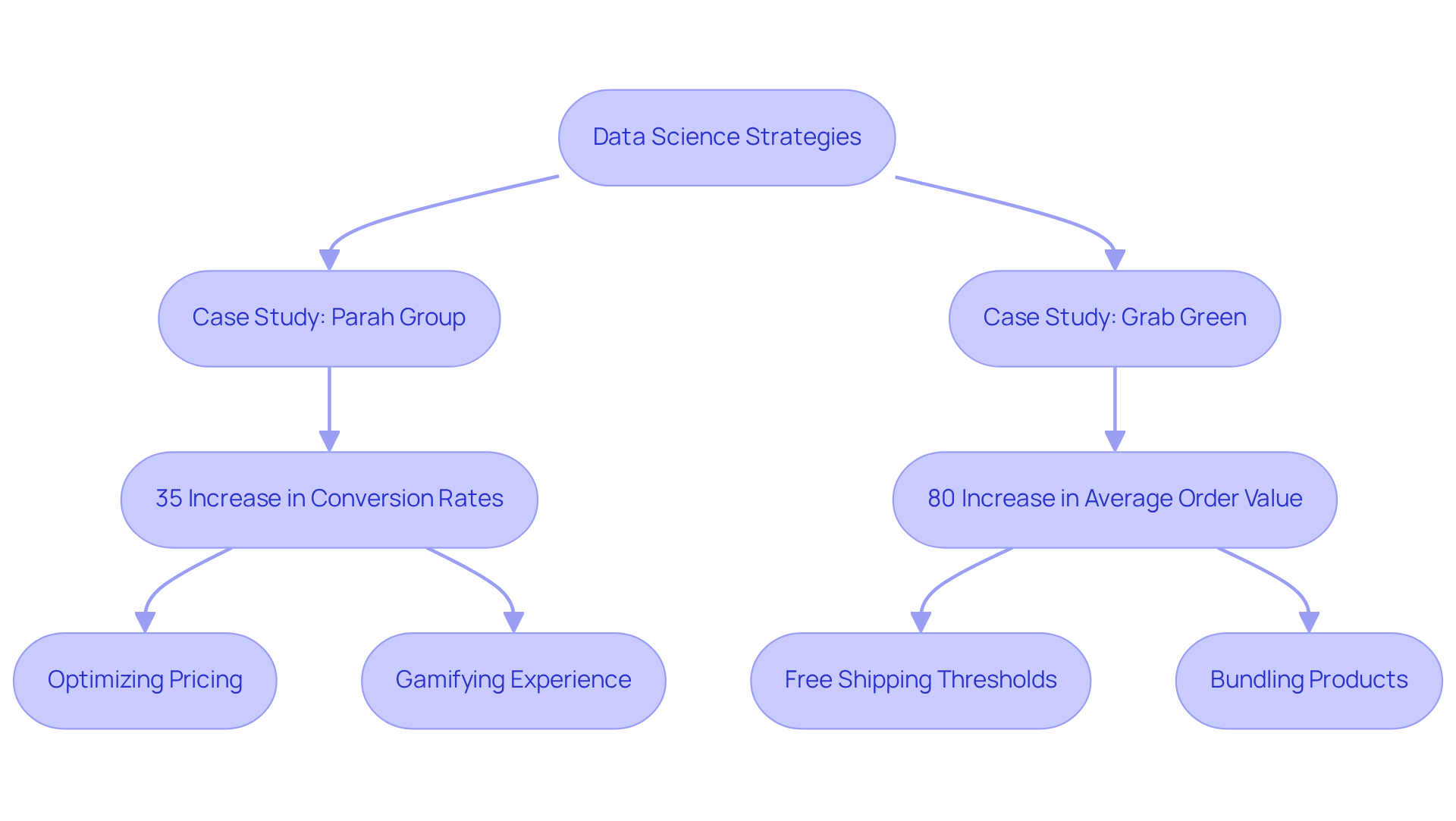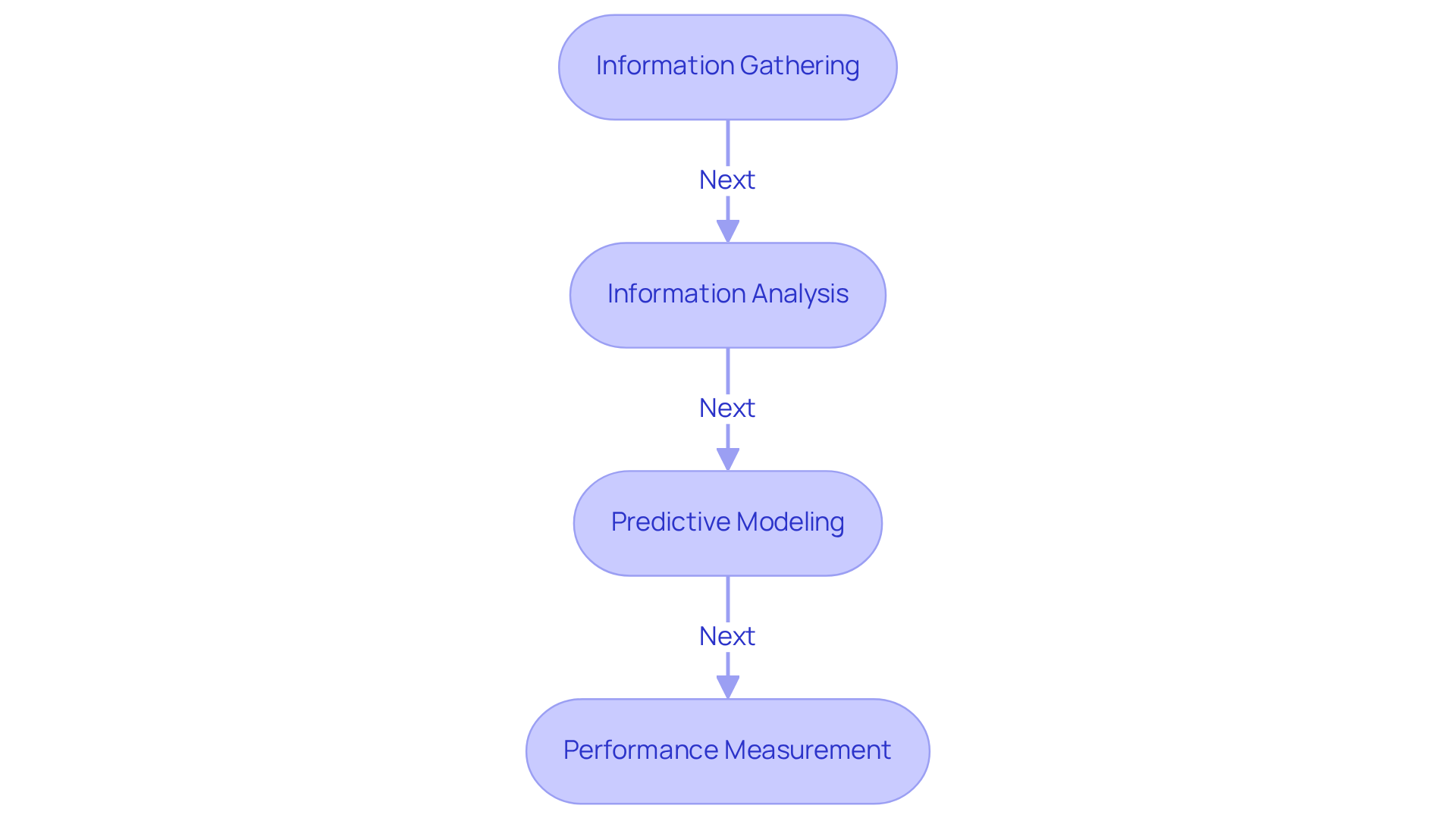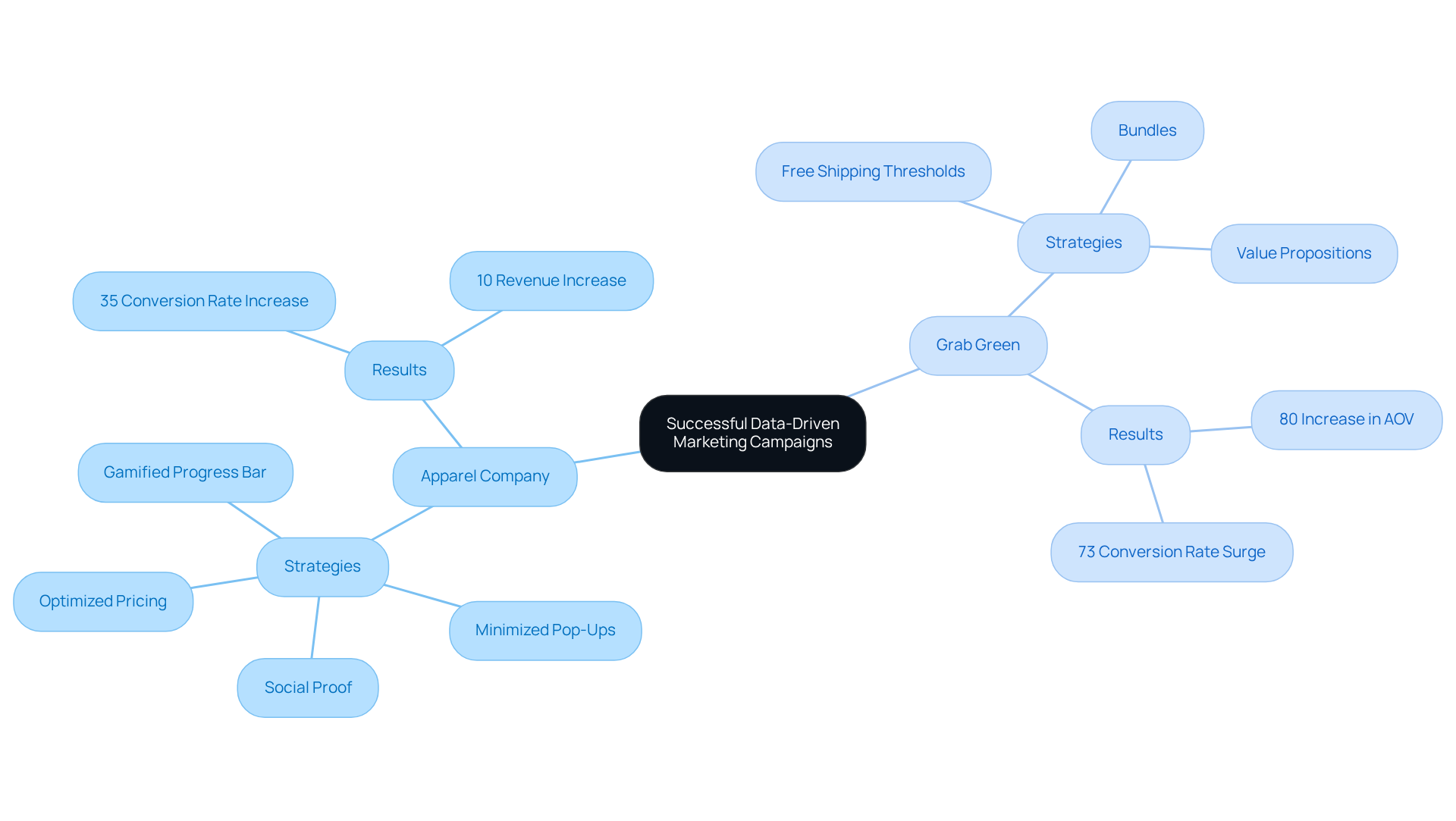
Overview
This article examines the critical role of data science in shaping marketing strategies for direct-to-consumer (DTC) brands. By leveraging data science, these brands can significantly enhance their targeting, personalization, and overall campaign effectiveness.
Through compelling case studies, we illustrate how companies have achieved remarkable increases in conversion rates and average order value by making informed, data-driven decisions. This underscores the necessity of utilizing analytics to adeptly navigate the competitive landscape of the market.
Introduction
The intersection of data science and marketing is revolutionizing the landscape for direct-to-consumer (DTC) brands, unlocking unprecedented opportunities for growth and engagement. By harnessing advanced analytics and machine learning techniques, marketers can derive critical insights into consumer behavior, optimize campaigns, and significantly enhance conversion rates.
However, as competition intensifies and customer acquisition costs escalate, the question arises: how can brands effectively leverage data to maintain their competitive edge? A thorough exploration of the essential components and successful case studies of data-driven marketing not only reveals the potential for substantial returns but also underscores the urgent necessity to adapt in an ever-evolving marketplace.
Defining Data Science in Marketing
The science of information in promotion involves the strategic application of statistical analysis, machine learning, and information mining techniques to extract actionable insights from extensive datasets. This process includes the collection, processing, and analysis of information, leading to a deeper understanding of consumer behavior, forecasting trends, and refining marketing campaigns. By leveraging analytical science, marketers can make informed decisions that significantly , resulting in improved campaign effectiveness.
As Geoffrey Moore aptly states, , underscoring its pivotal role in driving higher conversion rates and fostering customer engagement. Furthermore, as Eric Schmidt highlights, the increasing reliance on skilled information specialists is essential for .
By 2025, the integration of data science and marketing strategies will be critical, as . exemplifies this approach through its expert techniques, focusing on sustainable growth and profitability for DTC brands. Our distinctive method includes a comprehensive onboarding process that establishes the foundation for , ensuring that we customize our strategies to address the specific needs of each client.
Proven case studies illustrate significant enhancements in revenue per visitor and conversion rates, showcasing how can yield transformative outcomes. Companies must act decisively to capitalize on the insights that information offers, especially considering that businesses are forfeiting $5.2 million in revenue due to unexploited information.

The Importance of Data Science for DTC Brands
In the realm of , analytics play a pivotal role in navigating the complexities of modern promotion. As rise and competition intensifies, it becomes imperative for companies to harness to refine their strategies.
's case studies serve as a testament to this approach, illustrating how can yield significant enhancements in and profitability. For example, a $30M apparel company experienced a remarkable 35% increase in conversion rates after implementing targeted strategies, such as optimizing product pricing and gamifying the shopping experience.
In a similar vein, Grab Green, a $15M cleaning product company, achieved an impressive 80% increase in by experimenting with free shipping thresholds and introducing bundles.
These instances underscore how [data science and marketing](http://parahgroup.com/blogs/understanding-data-science-for-marketers-key-insights-for-dtc-brands) empower DTC brands to analyze customer behavior, segment audiences, and tailor messaging to meet specific needs. This targeted approach not only amplifies customer engagement but also optimizes expenditure efficiency, ultimately leading to .
Companies that adeptly leverage data science and marketing can secure a competitive edge by making informed decisions that align with consumer preferences and market trends.

Key Components of Data Science in Marketing Strategies
Essential elements of analytics in encompass information gathering, examination, forecasting models, and performance assessment. Data collection is pivotal, involving insights from diverse sources such as customer interactions, website analytics, and social media engagement. For in 2025, will likely streamline the process of capturing and preferences, underscoring the necessity for efficient .
Information analysis transforms raw data into , revealing patterns and trends that guide promotional decisions. This critical phase enables the identification of customer segments, allowing for the tailoring of marketing strategies to meet specific needs. , which leverages historical data, projects future consumer behavior, empowering companies to anticipate needs and adjust their offerings accordingly. For instance, brands can employ predictive analytics to optimize inventory levels based on forecasted demand, thereby enhancing operational efficiency.
in assessing the effectiveness of promotional campaigns, facilitating through real-time feedback. This iterative process ensures that remain in sync with consumer expectations and market dynamics. As industry specialists emphasize, effective data science and marketing through information gathering and examination are essential for companies striving to thrive in a competitive landscape, where understanding consumer behavior is paramount for success. By harnessing these analytical elements, DTC companies can enhance their promotional efficiency and cultivate sustainable growth.

Case Studies: Successful Data-Driven Marketing Campaigns
Numerous DTC companies have effectively harnessed data science to drive significant marketing campaigns, particularly through techniques. A prime example is a $30M apparel company that collaborated with to tackle low conversion rates. By redesigning their homepage to emphasize social proof, minimizing unnecessary pop-ups, optimizing product pricing, and gamifying the progress bar for free shipping thresholds, they realized an impressive 35% increase in conversion rates and a 10% rise in revenue per visitor.
Similarly, Grab Green, a $15M cleaning product company, adopted , including:
- Testing free shipping thresholds
- Introducing bundles and multi-packs
- Highlighting value propositions on larger items
This initiative resulted in an 80% increase in and a 73% surge in conversion rates. These case studies underscore the into marketing strategies, leading to for DTC brands. Parah Group's not only propels revenue growth but also ensures sustainable profitability, solidifying their status as a leading expert in the field.

Conclusion
Data science is an indispensable component of the marketing strategies employed by direct-to-consumer (DTC) brands, transforming extensive datasets into actionable insights that drive business success. By leveraging statistical analysis, machine learning, and information mining techniques, marketers can enhance targeting and personalization, ultimately leading to improved campaign effectiveness. The integration of data science into marketing has evolved from an option to a necessity for brands aspiring to thrive in a competitive landscape.
Key points throughout this article highlight the critical role of data science in understanding consumer behavior, forecasting trends, and optimizing marketing campaigns. Case studies illustrate how DTC brands, such as a $30M apparel company and a $15M cleaning product company, achieved remarkable increases in conversion rates and average order values through data-driven strategies. These examples underscore the tangible benefits of employing data science, showcasing how informed decision-making can significantly impact profitability and customer engagement.
As the marketing landscape continues to evolve, embracing data science is crucial for DTC brands aiming to stay ahead. Companies must prioritize the development of robust data strategies to capitalize on the insights available, ensuring they do not forfeit potential revenue. By committing to data-driven approaches, brands can enhance their marketing effectiveness while fostering sustainable growth and long-term success in the marketplace.
Frequently Asked Questions
What is data science in marketing?
Data science in marketing involves the strategic application of statistical analysis, machine learning, and information mining techniques to extract actionable insights from extensive datasets, leading to a better understanding of consumer behavior and improved marketing campaigns.
How does data science enhance marketing effectiveness?
By leveraging analytical science, marketers can make informed decisions that enhance targeting and personalization, which results in improved campaign effectiveness.
What role does information play in business decisions according to Geoffrey Moore?
Geoffrey Moore states that information is crucial for making smart business decisions, highlighting its importance in driving higher conversion rates and fostering customer engagement.
Why is the integration of data science and marketing strategies critical by 2025?
The integration will be critical because companies that utilize data efficiently are expected to outpace their competitors in the marketplace.
What is Parah Group's approach to data-driven marketing?
Parah Group employs expert Conversion Rate Optimization (CRO) techniques, focusing on sustainable growth and profitability for DTC brands, with a comprehensive onboarding process to customize strategies for each client's specific needs.
What evidence supports the effectiveness of data-driven decisions in marketing?
Proven case studies show significant enhancements in revenue per visitor and conversion rates, demonstrating the transformative outcomes of data-driven marketing decisions.
What is the financial impact of unexploited information for businesses?
Businesses are losing $5.2 million in revenue due to unexploited information, emphasizing the need to capitalize on the insights that data provides.
FAQs











